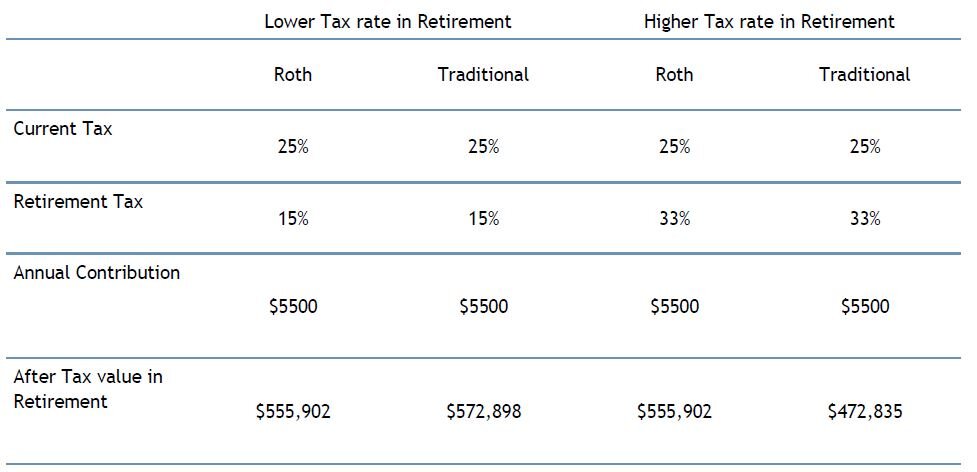To Roth or not to Roth
/To Roth or not to Roth, that is the question. That is the question we hear frequently from clients of all ages when discussing their options for retirement accounts. Roth IRAs have some unique characteristics that make them excellent savings tools for certain individuals, but they are not the solution for everyone.
It all comes down to one question.. Do you think you are in a lower tax bracket right now, than you will be upon retirement. For most millennial’s this answer is yes. It is reasonable to believe that your earnings will grow and grow each year as you progress in your career, putting you at a higher tax bracket upon retirement. What about baby boomers who might be in the later stages of their career? A Roth IRA might still make sense. The primary difference between a traditional and a Roth IRA has to do with the tax treatment of your contributions.
With a Roth IRA, you will pay taxes on your contribution when you make it. With a traditional, that contribution will only tax deductible, still leaving you on the hook to pay taxes on it down the road when you reach age 59 1/2. This is the major advantage of a Roth IRA, you only pay taxes on the contributions. Whereas with a traditional, you will end up paying taxes on both your contributions and the earnings. Especially if you are in your 20s-40s, this amount of money will be compounding and growing for many years and be able to be withdrawn tax free with a Roth IRA.
Now what if you answered no? What if you believe your tax bracket will be lower when you retire? If you think you are in a higher tax bracket today than you will be in retirement, then you might be better off with a traditional IRA. Due to the nature, you would probably be better suited taking the up front deduction on your contribution to the traditional IRA. With the Roth IRA, your earnings will grow tax free. With the traditional, your IRA will grow tax deferred.
In the table below we see the effects of how the timing of your tax rates will affect the outcome of your retirement savings. On the left side the tax bracket at retirement is lower than current and on the right we have a higher tax bracket at retirement. With a lower projected retirement tax bracket the traditional IRA ended up being the better choice. However for the individual with in a higher tax bracket upon retirement, the Roth ended up being a more prudent choice. (Scenario assumes 7% return for 30 years)
Now there are some other considerations to make when making this decision, because it is not as simple as it seems. The reality of the situation is that it is very hard to predict where your income will be in the next 10, 20, maybe 30 years from now. So it is hard to tell whether you'd be better off going with the Roth or traditional IRA. There is also the argument that it never hurts to have some control on your different cash flows. By securing a Roth IRA, you are ensuring that in the future you will be able to access money tax free.
Roth IRAs will allow you to grow your money tax free, forever. I use the word forever because unlike traditional IRAs, Roths do not require you to take required minimum distributions (RMDs) during your lifetime. In fact, Roth IRAs are the only tax sheltered retirement plan that does not require RMDs. Another differentiator for the Roth IRA is that it allows you to leave the IRA as a bequest to your heirs, tax free. Now in this case your heirs would have to take RMDs, but they still will not have to pay any federal income tax.
A discussion of Roth IRAs would not be complete without a mention of a Roth feature within a 401(K). For the majority of our clients who are over the IRA income limits this is a great solution. By electing a Roth feature within a 401(k) plan you can enjoy the benefits of a Roth IRA, gathering your after tax contributions into a Roth account. It is important to note that only the employee salary deferral contribution is eligible to be allocated into the Roth portion of the account. The matching contributions from the employer must always be done in the traditional pre tax format.
Once we decide which is right for you, how is it going to be funded? Both the Roth and the traditional IRA will be funded through contributions from your earned income, that is sort of the entire point. What if I already have an old 401k account? Good news, 401K accounts are eligible to be rolled into a Roth or traditional IRA. And if you have a Traditional IRA, you can roll that into a Roth IRA as well.
You have decided that all or some of your IRA should be converted to a Roth IRA, what else do you need to know? There are three ways to accomplish a Roth Conversion. The first being a 60—day rollover. In this method you will take a direct delivery of your funds out of your traditional IRA at which point you have 60 days to roll them into your new Roth IRA. Failing to do so within 60 days will result in a 10% early distribution tax, and the distribution will be taxable in the year received. The next option would be a trustee to trustee transfer. This method is one of the “safest” as it essentially guarantees the chance that your funds would end up taxable. This method simply consists of having your IRA trustee to direct the funds to the trustee of your new Roth IRA.
The most important concept to understand when it comes to conversions is the fact that your funds will be subject to regular income tax in the year that the conversion occurs. This does not apply to any nondeductible contributions, these will not be taxable since they were originally tax deferred.
To Roth or not to Roth is a serious consideration everybody will go through during their retirement planning period. It can be a tricky decision that can end up having substantial impacts on the longevity of your retirement assets. This decision must fit into and be apart of your overall financial plan. Clearwater Capital Partners dedicated to help assist and guide our clients throughout every step of this journey.







